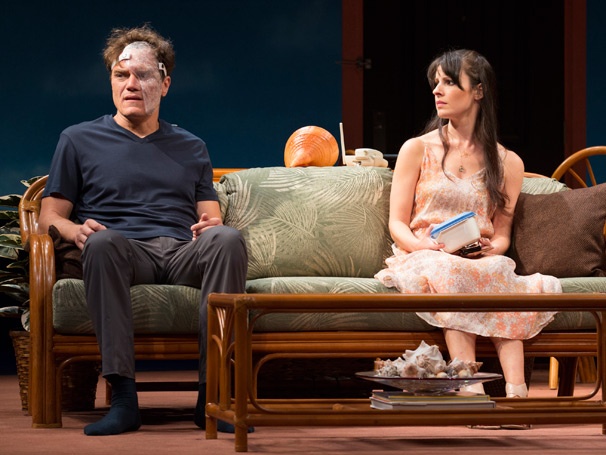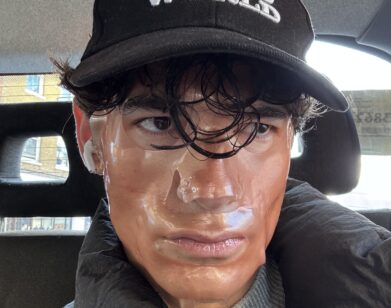Kate Arrington’s Grace Notes

ABOVE: KATE ARRINGTON (RIGHT) WITH MICHAEL SHANNON IN GRACE.
At the outset of Craig Wright’s new play Grace, Kate Arrington’s Sara is a young woman who doesn’t realize she’s trapped. Sure, she’s not crazy about her new Florida surroundings—she’s just moved there from the Midwest with her husband, Steve (Paul Rudd), to pursue a business venture Steve is convinced will make them rich, a chain of Christian gospel hotels—but she loves her husband. Sure, Steve doesn’t seem in any special hurry to get her pregnant—her dearest wish—but he’s just busy, right? And at least Sara has her faith in God to get her through.
Things start to change for Sara, though, thanks to a burgeoning friendship with her next-door neighbor, Sam (Michael Shannon, Arrington’s real-life long-term partner), a scientist for NASA whose face has been disfigured in a horrible accident that claimed the life of his fiancée. He, too, is home through the day, and visiting him to chat opens up Sara’s life, even as Steve’s begins to fall apart.
Arrington is both appealing and vulnerable in a role that requires an exceedingly delicate touch (as she explains, it’s hard to get New York audiences to sympathize with an evangelical Christian)—and her chemistry with Shannon is can’t-look-away engrossing. We talked to her about growing up with God, acting backwards, and her surprising Presidential connection.
ALEXANDRIA SYMONDS: This is the first time that Grace has been on Broadway, but the play itself has been kicking around for almost a decade. Did you get a chance to see any of the previous iterations?
KATE ARRINGTON: I did, I saw it in Chicago. I knew Mike, but not well. It wasn’t the first time I’d seen him on stage, but I think it was the first time I really sort of registered him. [laughs]
SYMONDS: Do you remember your impressions of the play?
ARRINGTON: Yeah, I think that probably the most impressive thing to me about the play is how physically certain moments sat with me. I think it’s a play that really can get under your skin and can really create some profound anxiety in the watching, which I think is amazingly cool to have happen in a theater. But also, I don’t know how to say this without sounding a little hokey, but to me, theater is a spiritual experience. Probably the reason I do theater is it, I guess, comes the closest to feeling like God, or to feeling a spiritual experience that people can have together. I remember that, too. Yeah, I had a great time watching it, and I’ve wanted to do it ever since.
SYMONDS: Yeah, I imagine that must be a really different way to be exposed to a play than just by reading it.
ARRINGTON: It’s weird. It’s not ideal, actually. There’s also this interesting thing—when you’re in a play, you never really have a sense of what an audience is experiencing. The experience of doing a play is so different from the experience of seeing it. It’s kind of cool, also, to have the dual perspectives on this one.
SYMONDS: Do you have much in common with Sara?
ARRINGTON: Yes and no. I have a lot of compassion for what I would call her plight as a woman. I think Sara has a hard time finding words and finding her voice and finding herself in her marriage. That’s something that I have experienced and have certainly watched my mother experience, my grandmother experience. In a way, I definitely do relate to her. It’s a little tricky, with the fundamental Christianity, because I come to this from the South, and I have definitely, a complicated and kind of gnarly relationship with fundamental Christianity. People tried to save me at various points in my life. [laughs] So it’s interesting for me to see how a New York audience bristles [at Steve’s attempts to save people], when I used to go to church growing up, because I got that all the time.
SYMONDS: That’s really funny. So you’re accustomed to it as a part of everyday life.
ARRINGTON: Exactly, it really is. It’s what you do, because it’s what being a good Christian is. If you go to one of those churches, it’s absolutely required that you are constantly in conversation with people about these things. And also, I do think I have a spirituality, and I try and sort of try to mix that with the Christianity, and that’s, I think, a struggle that Sara’s having, too, in the play: going between the scriptures of Christianity, and the rigidness of that, and the spirituality that she’s experiencing at the end of the play. I think that’s difficult for her.
SYMONDS: I think that you could make the case that any one of the three main characters is the protagonist. For Sara, it’s almost a coming-of-age story. She’s moving away from what she feels like she should do—marry the guy you meet in Bible study, have children—to what she feels like she wants to do. When you were approaching the character, how did you broach that transformation?
ARRINGTON: Oh, it’s funny, do we all have that experience? I certainly did. I had that exact experience with Mike—when I met Mike, I was engaged; it was a very difficult, painful thing. And we also have two producers who have had this exact same experience. I think [for] women, it’s not a rare thing to find yourself in that transition between what you have in your head as what’s the right thing to do and then knowing that if you go on that path, you’re going to miss out on something that you may never get over and you may never get back. It definitely speaks to me, and I’ve heard it speak to others, too. I guess it has to do with these ideas that we have as girls growing up, and wanting to be good, and that moment of moving away from that, or redefining it, at least.
SYMONDS: There are some really unique touches in this particular staging of the play. There’s the stage set, which sometimes represents one house and sometimes represents two; and the script goes in reverse a couple of times. When you act in reverse, you all do a really good job of exactly mirroring how you do the scene when it’s going forward in time. Is that hard?
ARRINGTON: It’s really hard! And we were kind of geeky about it. We were like, if we’re going to do it, then we want to do it. We videotaped a lot of rehearsals, watched them going backwards, and we tried to get everything, we tried to get, literally, how breath goes backwards. Part of it is just, as actors, wanting to embrace the challenge of it; and part of it is, in terms of the audience’s experience of it, you want for there to be a sense of something different. So, it definitely accomplishes that, as well. Yeah, it’s really hard! I mean, it’s getting easier now, we’re sort of finding the dance of it. Although, oddly, Paul Rudd was born to act backwards. [laughs] I’ve never seen anything like it—he was brilliant at it. Like, even before we watched the videotape. Weird stuff.
SYMONDS: It’s really remarkable how he un-crumples.
ARRINGTON: At the beginning? Amazing, right?
SYMONDS: Can you talk about how you and Paul worked together in order to develop your stage marriage? I’d imagine that probably functions pretty differently from your real-life relationship.
ARRINGTON: It’s been so easy. He’s one of those guys—certain guys are just so easy to be married to on stage. He just has such an ease about him. We knew each other—oddly, I’d been married to a few of his really good friends, on stage. So we knew each other through these mutual friends. I wondered for a second, I was like, “Wow, it going to be weird for him to be trying to develop a relationship with me, with Mike in the room?” And it wasn’t at all; it just didn’t faze him. Within the first week, rehearsal would stop and we’d be holding hands, or little things like that, which start to happen where you just start finding this connection that’s easy and constant. It wasn’t a problem at all. He’s just a sweetheart, obviously. There are no issues with boundaries, or anything like that.
SYMONDS: Do you think that there are different kinds of love? Like the relationship Sara and Steve have is a different kind of love than you’ve experienced before, or do you think that it’s something essential and it doesn’t matter who’s experiencing it?
ARRINGTON: I do think they’re different kinds of love. And I do think you need different primary kinds of love at different points in your life. Sara’s relationship with Steve—I think she really loves him, and I think it’s very painful to watch him go through what he goes through as a result of her decisions. But I do think she is, or at least becomes, just an older person than he is over the course of the play. I think he has sort of a mathematical mind when it comes to faith. Steve’s mind works like, you do this, you do this, you get this—this is how it works. And Sara’s experience with faith is that everything exists at the same time. Like, the most magical moment she’s ever had in her life is when she felt like everything else was listening, it’s sort of basic.
SYMONDS: I don’t want to harp too much on the fact that you and Mike are partners in real life, because I think other people probably will. But I would like to know, when you first approached playing the role—there’s a comfort that long-term relationships give you that you don’t feel when you first meet someone. So how did you two go about erasing that?
ARRINGTON: Well, I’m not sure how to answer this question. Mike and I, working together, there wasn’t a comfort that needed to be erased! It’s been challenging, and I have such tremendous respect for him as an actor. It actually has been, probably, a little less comfortable. The relationship has not made it easier, it hasn’t made it harder. It’s just separate for us. We really have tried to separate it, and it hasn’t been difficult for whatever reason.
SYMONDS: I have to ask, before I hang up with you, because I’m dying to know—I read that you were roommates with Barack Obama’s sister.
ARRINGTON: It’s true, it’s absolutely true! She’s one of my favorite people alive, Maya Soetero. When I first moved to New York —she’s about 10 years older than I am—she was a teacher on the Lower East Side, and we both were working at the weirdest restaurant ever. It’s still there, actually, I just checked. It’s called Monaco, it’s on 80th and Amsterdam, and I think it might be a front. [laughs]
She was a bartender there along with her boyfriend at the time, Cory, and I got a job there. We just became very close; I started to teach workshops for her classes on the Lower East Side. And we both broke up with our boyfriends at the same time, the following summer, and we got a sublet together, just for three months, but we got a sublet together on 50th and 9th. We had such a great time. We were both kind of depressed and smoking entirely too much and living in this studio apartment with, like, her huge dog and my Siamese cat, it was ridiculous, all in this studio.
SYMONDS: That can be the best time, though—wallowing with someone.
ARRINGTON: Yeah, it was perfect. It was exactly what we both needed. Then she moved to Hawaii to go to grad school, and she ended up getting married. I got to see her quite a bit when she was campaigning for him. But the funniest part was just realizing he was her brother, because she always talked about her brother. I had never met him, but we were living together at Thanksgiving, and she went to Chicago to see him and she came back and she was obsessing. She loves him, obviously, and really looks up to him, and would talk about him all the time. And then finally, years later, I was like, “Wait a minute. Is that Maya’s brother?!”
We did go to the very first, at the very beginning, this meeting in this building on the West Side Highway, it was so weird. It was a penthouse, it was totally empty and there were folding chairs set up and some nasty hummus and carrot sticks, and Maya is speaking about why her brother should be president. And I’m like, you know, if I were trying to start a theater company, and this was our first meeting, I think we would have a better chance of putting on a play! But, yeah. Now he’s the President!
GRACE IS CURRENTLY PLAYING AT BROADWAY’S CORT THEATRE. FOR TICKET INFORMATION, CLICK HERE.






